|
|
|
Sort Order |
|
|
|
Items / Page
|
|
|
|
|
|
|
| Srl | Item |
| 1 |
ID:
131700
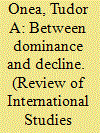

|
|
|
|
|
| Publication |
2014.
|
| Summary/Abstract |
This article investigates the role of status considerations in the response of dominant powers to the rise of emergent states. Accordingly, the hypothesis explored is that dominant actors are prone to fear that they will lose their upper rank, and, due to this status anxiety, resist the efforts of emergent powers to match or surpass them. The article begins by explaining why political actors deem status important and puts forward a theory of status anxiety in world politics. The more pronounced is this anxiety across status dimensions (economic and military capabilities as well as prestige), the higher the likelihood of conflict. This argument is then tested against competing theories of dominant power behaviour in two cases: the relations between France and Britain from the 1740s to Napoleon and those between Britain and Germany from the 1880s to World War One.
|
|
|
|
|
|
|
|
|
|
|
|
|
|
|
|
| 2 |
ID:
175291


|
|
|
|
|
| Summary/Abstract |
Wedges and frames, two much-studied strategies of American political combat, are generally thought to be partisan weapons, meant to manipulate voters into making trade-offs that favor the political actor wielding them. My inquiry here explores whether there exists anything comparably schematic to wedges and frames at work in attempts by American politicians not to polarize but to find consensus, not to cater to extremes but moderate them. Despite the seeming paucity of such efforts in American public discourse, there is one such common and as-yet untheorized scheme, which uses the two issue positions involved in wedges to overcome the ill effects of reframing and the two value dimensions involved in reframing to overcome the ill effects of wedges. I elaborate this discursive structure by examining its presence in a number of American political debates, showing how it differs from other contemporary normative-theoretic frameworks for understanding compromise in American politics.
|
|
|
|
|
|
|
|
|
|
|
|
|
|
|
|
| 3 |
ID:
132312
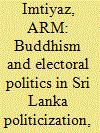

|
|
|
|
|
| Publication |
2014.
|
| Summary/Abstract |
Organized religions often play a significant role in the political affairs of any country when political actors carefully employ them to pursue power. Buddhism is the major religion on the island of Sri Lanka, and often it becomes a powerful symbol for Sinhala-Buddhist politicians. This study examines the interaction between Buddhism and politics in Sri Lanka, and will attempt to examine the religious factors in Sri Lanka's ethnic conflict between the two nations; namely, Tamil and Sinhala. It will examine how the politicization of Buddhism helped Sinhala political elites and leaders in their quest for power, reinforcing religious and ethnic tensions, and finally will discuss some solutions to de-religionize the state structure to help Sri Lanka enjoy the fruits of modernization and democracy.
|
|
|
|
|
|
|
|
|
|
|
|
|
|
|
|
| 4 |
ID:
130927
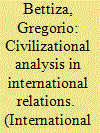

|
|
|
|
|
| Publication |
2014.
|
| Summary/Abstract |
This article maps and develops-theoretically and empirically-the field of civilizational analysis in international relations (IR). In particular, it teases out a more explicit "civilizational politics" line of research, which builds upon latent and underdeveloped themes in the civilizational turn in IR. "Civilizational politics" offers an avenue for theoretically inclined, empirically minded scholars to explore how social and political actors have come to understand, change, and construct world politics as if plural civilizations existed and their relations mattered. The article anchors "civilizational politics" research to a modernist-constructivist approach to IR and structures it around two key steps. The first step is to recover and interpret subjective and intersubjective meanings through participants' discourse. The article proposes an understanding of civilizations as "imagined communities" narrated by political and intellectual elites: as essentialized or non-essentialized entities; and as clashing/conflicting or dialoguing/engaging with each other. The second step outlines three causal pathways that explain how narrated civilizational imaginaries affect world politics and turn civilizations into social facts: by guiding and structuring social action; by shaping and becoming embedded in formal institutions and patterned practices; and by bestowing recognition and socially empowering actors claiming to speak for civilizations. The empirical import of a "civilizational politics" line of research is demonstrated through a re-reading of Turan Kayao?lu's article "Constructing the Dialogue of Civilizations in World Politics: A Case of Global Islamic Activism."
|
|
|
|
|
|
|
|
|
|
|
|
|
|
|
|
| 5 |
ID:
133647
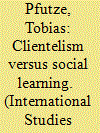

|
|
|
|
|
| Publication |
2014.
|
| Summary/Abstract |
Most research on the effects of international migration on democratic institutions in sending countries focuses on how emigration changes the civic and democratic values of those left behind. Little attention has been given to how the additional income provided by migrant remittances alters the incentive structure of the political actors involved and how this will affect political outcomes. This paper develops a voting model that accounts for the effect of higher income through remittances and shows that its expected effects on voter turnout patterns differ in important ways from those of improved civic values. Taking these predictions to the data, it is shown that, for the case of Mexican municipal elections over the year 2000-2002 period, the empirical evidence strongly supports the notion that international remittances had a positive effect on electoral competitiveness in Mexico by reducing the clientelistic power of the formerly dominant state party (Institutional Revolutionary Party). This result is robust to the use of instrumental variables.
|
|
|
|
|
|
|
|
|
|
|
|
|
|
|
|
| 6 |
ID:
130959
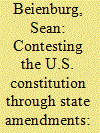

|
|
|
|
|
| Summary/Abstract |
IN MARCH OF 2013, REPUBLICAN LEGISLATORS in North Dakota agreed to challenge Roe v. Wade by forwarding a "personhood" amendment to voters that will appear on the 2014 ballot. Such an amendment would change the state's legal definition of personhood to include unborn fetuses-a move that backers have explicitly discussed as part of a challenge to a Supreme Court decision they view as having been wrongly decided.1 The Court may pronounce itself the final arbiter of the Constitution, but Americans outside of Washington, DC do not necessarily agree.2
Such efforts by state actors to take the Constitution away from the courts mirror a recent shift in political-legal scholarship, in which court-centered accounts of constitutional interpretation and construction have been rightly condemned.3 Scholars have turned instead toward a renewed emphasis on the political contestation of non-judicial actors in enforcing the Constitution.4
|
|
|
|
|
|
|
|
|
|
|
|
|
|
|
|
| 7 |
ID:
130960
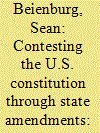

|
|
|
|
|
| Summary/Abstract |
IN MARCH OF 2013, REPUBLICAN LEGISLATORS in North Dakota agreed to challenge Roe v. Wade by forwarding a "personhood" amendment to voters that will appear on the 2014 ballot. Such an amendment would change the state's legal definition of personhood to include unborn fetuses-a move that backers have explicitly discussed as part of a challenge to a Supreme Court decision they view as having been wrongly decided.1 The Court may pronounce itself the final arbiter of the Constitution, but Americans outside of Washington, DC do not necessarily agree.2
Such efforts by state actors to take the Constitution away from the courts mirror a recent shift in political-legal scholarship, in which court-centered accounts of constitutional interpretation and construction have been rightly condemned.3 Scholars have turned instead toward a renewed emphasis on the political contestation of non-judicial actors in enforcing the Constitution
|
|
|
|
|
|
|
|
|
|
|
|
|
|
|
|
| 8 |
ID:
131457


|
|
|
|
|
| Publication |
2014.
|
| Summary/Abstract |
This research examines the role of the Lebanese Armenian diaspora (LAD) during the unstructured conflict that was the second Lebanese civil war, which extended from 1975 until 1990. This research has two aims. The normative aim is to find patterns of diasporic activity in conflict such as to support positive activities and discourage negative activities. A second is to focus on an empirical case study of the LAD in order to demonstrate that the diaspora encouraged peace-making initiatives and discouraged peace-wrecking. Importantly, the LAD as a political actor in Lebanese society played a positive role in promoting dialogue, cooperation, conflict resolution and reconciliation and had a significant impact on politics in general and conflict behaviour in particular. This study concludes that it is worth studying diaspora behaviour in conflict because a diaspora could be a powerful actor in conflict resolution and peace-making.
|
|
|
|
|
|
|
|
|
|
|
|
|
|
|
|
| 9 |
ID:
151614


|
|
|
|
|
| Summary/Abstract |
The Islamic Revolutionary Guard Corps is a state sponsor of terrorism, economic juggernaut, internal security service, expeditionary force and key political actor.
|
|
|
|
|
|
|
|
|
|
|
|
|
|
|
|
| 10 |
ID:
132869
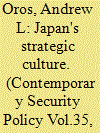

|
|
|
|
|
| Publication |
2014.
|
| Summary/Abstract |
Japan has shown three distinct strategic cultures since its emergence as a modern state in the 19th century: isolationist and non-military, militarist, and post-World War II strategic culture characterized by great reluctance to use military power abroad, even in collective self-defence. This article examines Japan's strategic culture and the potential for a fourth distinct strategic culture through the broader framework of security identity, arguing that this is evolving but has not changed as much as one might expect due to institutionalized antimilitarism and political support for the security practices it has engendered. Contemporary Japanese strategic culture can be understood through debates over recent Japanese security policy as well as actual changes in security practice. Domestic politics and a changing international environment are likely to lead Japan to a somewhat more active military role in the near term, but an analysis based on the dynamics of Japan's dominant security identity suggests that its strategic culture will continue to show a reluctance to use or develop military power beyond very limited scenarios, despite vocal efforts by some political actors to increase military activity abroad.
|
|
|
|
|
|
|
|
|
|
|
|
|
|
|
|
| 11 |
ID:
133961


|
|
|
|
|
| Publication |
2014.
|
| Summary/Abstract |
Using the Finnish National Election Study, this article examines whether one's opinion about immigration is related to the factual knowledge one has about it. Opinion is measured both in terms of a general attitude toward immigration and attitude toward work-related immigration. Contrary to what was expected, low issue saliency and high knowledge about immigration combined to predict pro-immigration attitudes. Additionally, low knowledge about immigration interacted with a disadvantaged labor-market position to predict anti-immigration attitudes. The impact of issue-specific knowledge on opinion seems to come mostly through interactions with other, conditioning, variables. The implications of these findings are discussed.
|
|
|
|
|
|
|
|
|
|
|
|
|
|
|
|
| 12 |
ID:
132941
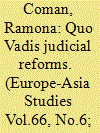

|
|
|
|
|
| Publication |
2014.
|
| Summary/Abstract |
This article examines judicial reforms in the new member states of the EU in a comparative perspective. It explores the interactions between domestic and European actors in the Czech Republic, Poland, Hungary, Romania and Bulgaria and explains why the EU has had a differential impact on the way the principle of judicial independence has been implemented nationally. The differential impact of the EU is explained by considering both the nature of EU conditionality and the relationship between the judiciary and the political actors at the domestic level. The comparison reveals that the power of the EU is greater when tensions at the domestic level between judicial and political actors increase.
|
|
|
|
|
|
|
|
|
|
|
|
|
|
|
|
| 13 |
ID:
132944
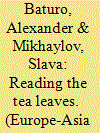

|
|
|
|
|
| Publication |
2014.
|
| Summary/Abstract |
In the absence of public information on the inner workings of the Russian political regime, especially during Medvedev's presidency, outside observers often have to rely on politicians' unguarded comments or subjective analysis. Instead, we turn to quantitative text analysis of political rhetoric. Treating governors as a quasi-expert panel, we argue that policy positions revealed in regional legislative addresses explain how elites perceived the distribution of power between Putin and Medvedev. We find that governors moved from a neutral position in 2009 to a clearly pro-Putin position in 2011, and that policy initiatives advocated by Medvedev all but evaporated from the rhetoric of governors in 2012.
|
|
|
|
|
|
|
|
|
|
|
|
|
|
|
|
| 14 |
ID:
131561
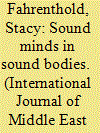

|
|
|
|
|
| Publication |
2014.
|
| Summary/Abstract |
Established in 1920, al-Nadi al-Homsi in São Paulo, Brazil was a young men's club devoted to Syrian patriotic activism and culture in the American mahjar (diaspora). Founded by a transnational network of intellectuals from Homs, the fraternity committed itself to what it saw as a crucial aspect of Syrian national independence under Amir Faysal: the development of a political middle class and a masculine patriotic culture. Al-Nadi al-Homsi directed this project at Syrian youth, opening orphanages, libraries, and schools in both Syria and in Brazil. In these spaces, men and boys congregated to celebrate a polite male culture centered on secular philanthropy, popular education, and corporeal discipline through sports. This article argues that during the 1920s and 1930s, al-Nadi al-Homsi's politics of benevolence was part of a larger social milieu that drew analogies between strong Syrian minds and bodies and a sovereign, independent Syrian homeland.
|
|
|
|
|
|
|
|
|
|
|
|
|
|
|
|
| 15 |
ID:
132328
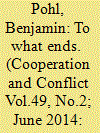

|
|
|
|
|
| Publication |
2014.
|
| Summary/Abstract |
Since the EU's Common Security and Defence Policy framework became operational in 2003, the Union has undertaken more than 20 crisis management operations. The drivers behind this activity remain debated. This article proposes a fresh interpretation based on governmental interests as defined by domestic political risks and opportunities. It argues that EU governments have tailored Common Security and Defence Policy action so as to satisfy domestic audiences. By way of illustration, this article examines the most ambitious Common Security and Defence Policy operation to date, the EU Force mission in Chad and the Central African Republic, as well as a deliberate non-intervention in a comparable case, in the eastern Democratic Republic of Congo in late 2008. By analysing the positions of the most relevant EU governments in each respective case, this article demonstrates how they corresponded to domestic political logic. Drawing on some 20 interviews with policy-makers, this article provides a theoretical account explaining the motives behind Common Security and Defence Policy decision-making rooted in original empirical evidence. The explanation for the haphazard pattern of Common Security and Defence Policy operations thus far can be found in the link between domestic politics and EU crisis management operations.
|
|
|
|
|
|
|
|
|
|
|
|
|
|
|
|
| 16 |
ID:
148613
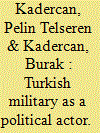

|
|
|
| 17 |
ID:
133935


|
|
|
|
|
| Publication |
2014.
|
| Summary/Abstract |
This paper shows how UN Security Council resolutions can facilitate the international socialization of an Islamist political actor. The study undertakes a process-tracing analysis of the negotiations and attempts to implement UNSC Resolutions 1559 and 1701 and then assesses their impact on Hezbollah's agency and political identity. The author argues that UNSC resolutions can inform processes of social influence that directly affect the activity of non-state actors and then cause international socialization. According to the analysis proposed international socialization has produced three main effects on Hezbollah that are: increased accountability; a shift in its legitimacy paradigm; and a mutation of Hezbollah's relation with the Lebanese state.
|
|
|
|
|
|
|
|
|
|
|
|
|
|
|
|
| 18 |
ID:
133310
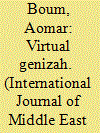

|
|
|
|
|
| Publication |
2014.
|
| Summary/Abstract |
After the establishment of the State of Israel, the Zionist narrative dominated the histories and historiographies of Middle Eastern and North African Jewries. Accordingly, Jews and Arabs were largely kept as distinct binaries divided by the intellectual walls that separated Middle East studies and Jewish studies programs. Local North African and Middle Eastern scholars also silenced or overlooked the Jewish dimension of Middle Eastern societies in the same manner that Israeli scholars ignored the historical connections between Arabs and Jews that existed both before and after 1948. The exclusive, sacred yet ebbing, nationalist paradigm has been plagued with historiographical fissures in recent decades, allowing a new wave of intellectual engagement by a young generation of Jewish and Muslim scholars who began to put the Jew and the Arab back into local and global histories formed through complex social, cultural, economic, and political networks.
|
|
|
|
|
|
|
|
|
|
|
|
|
|
|
|
| 19 |
ID:
133124
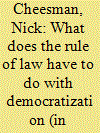

|
|
|
|
|
| Publication |
2014.
|
| Summary/Abstract |
Talk of the rule of law is today ubiquitous in Myanmar. But what does the rule of law mean? And what does it have to do with the country's nascent democratization? One way to conceptualize the rule of law is in terms of substantive legal equality. Burmese farmers and activists mobilizing through the lexicon of law to defend agricultural land against intrusive state projects engage with the rule of law in this sense. Another way is as a language of public and state security. Demands for the rule of law in response to violence in Myanmar's west correspond with this usage. Whereas in established democracies the rule of law as equality complements the rule of law as security, in a democratizing state the two are not necessarily compatible. The rule of law as an idea associated with substantive legal equality contributes to Myanmar's democratization, whereas when associated with public and state security it potentially undermines that democratization.
|
|
|
|
|
|
|
|
|
|
|
|
|
|
|
|
|
|
|
|
|